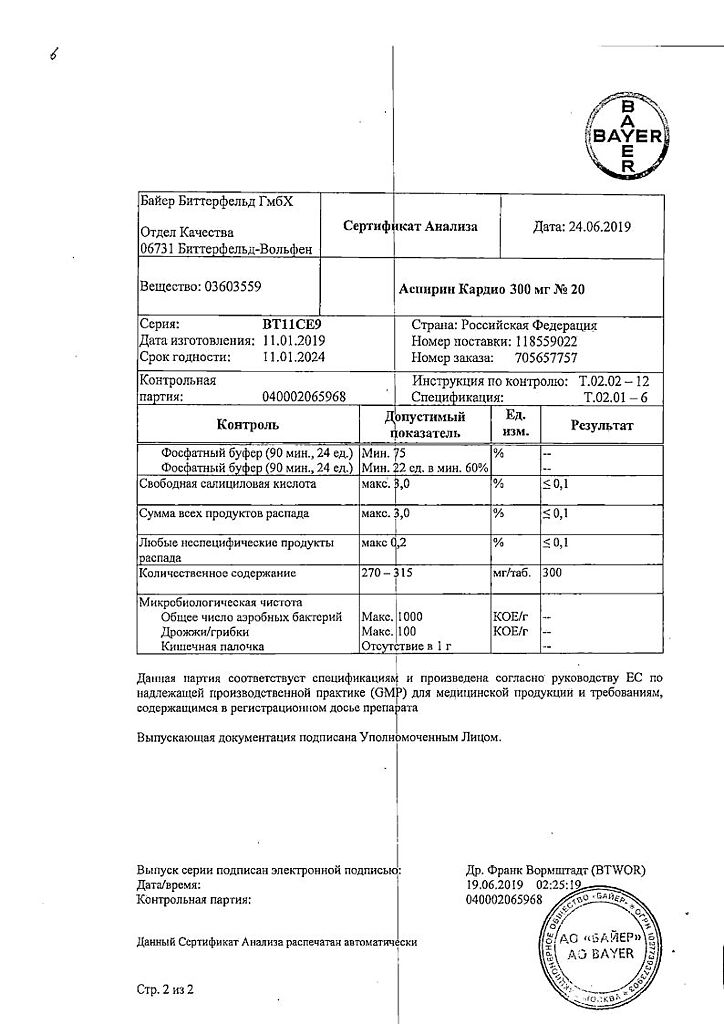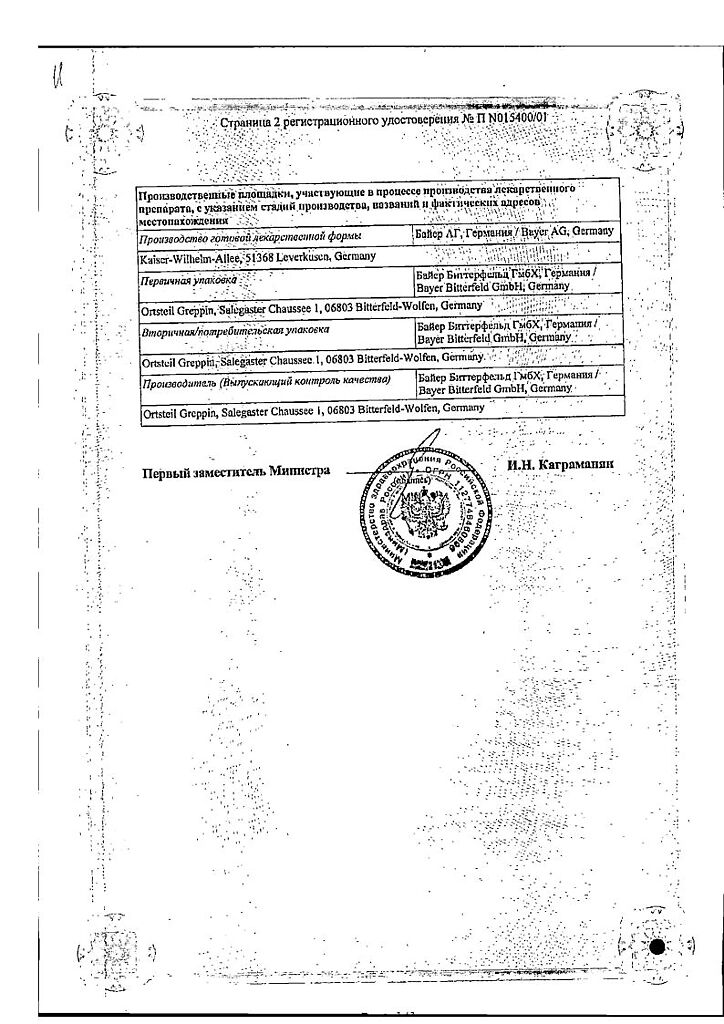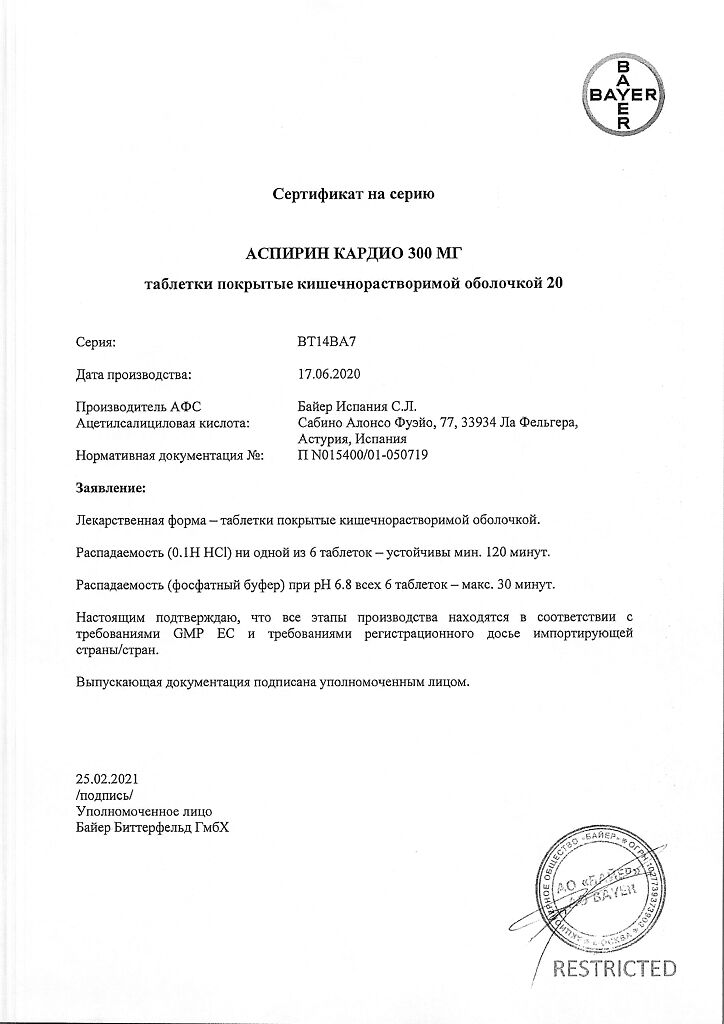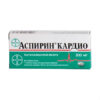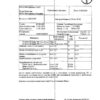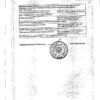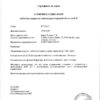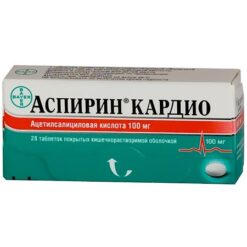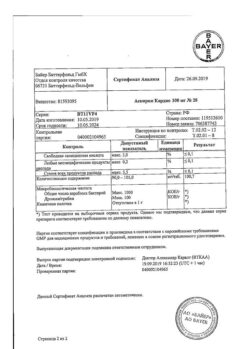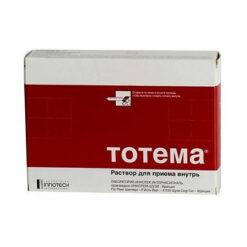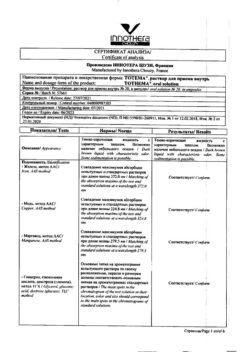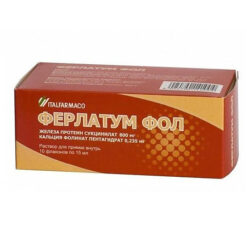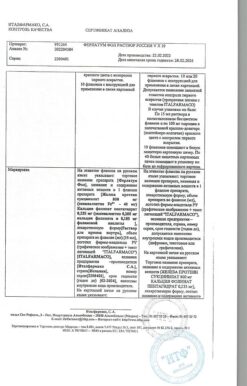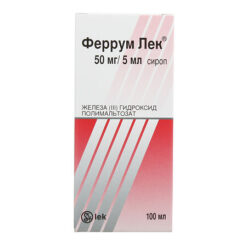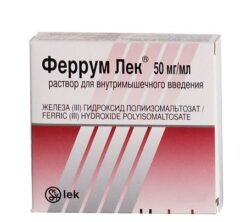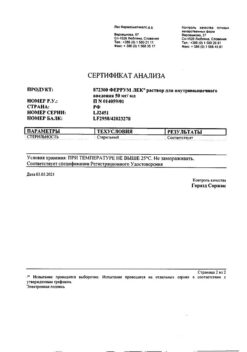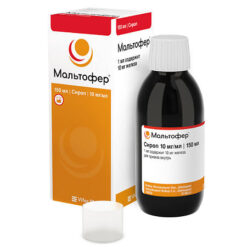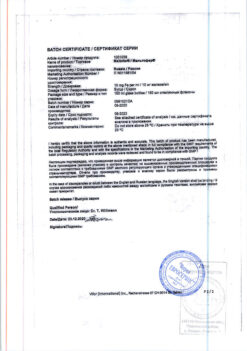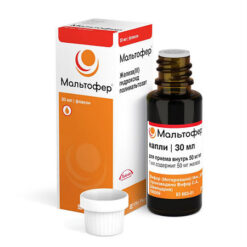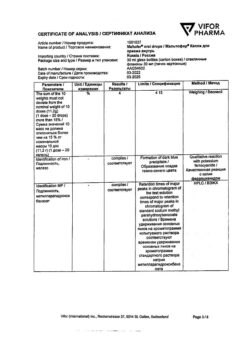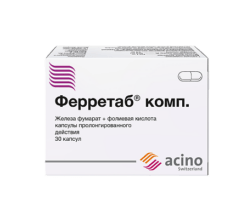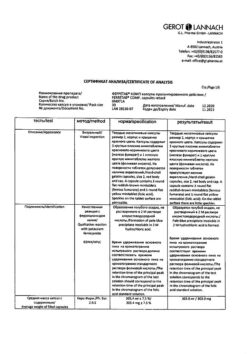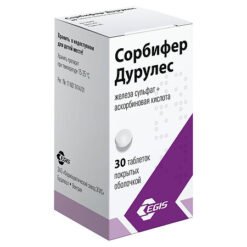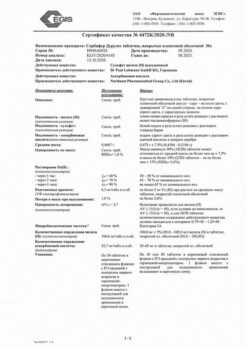No products in the cart.
Aspirin Cardio, tablets 300 mg 20 pcs
€1.00
Out of stock
(E-mail when Stock is available)
Description
Aspirin cardio is a non-steroidal anti-inflammatory drug (NSAID), non-narcotic analgesic, anti-aggregant. It has antipyretic, analgesic and anti-inflammatory effects, and also reduces platelet aggregation.
The main mechanism of action of acetylsalicylic acid is irreversible inactivation of cyclooxygenase enzyme, resulting in impaired synthesis of prostaglandins, prostacyclins and thromboxane.
Due to the reduction of prostaglandin production, the pyrogenic effect of prostaglandins on the centers of thermoregulation is reduced. In addition, the sensitizing effect of prostaglandins on sensitive nerve endings (which leads to a decrease in their sensitivity to pain mediators) is reduced.
The irreversible disruption of thromboxane A2 synthesis in platelets is responsible for the antiaggregant effect of acetylsalicylic acid.
At the same time, it should be noted that acetylsalicylic acid also blocks endothelial cell cyclooxygenase, in which prostacyclin is synthesized, which has antiaggregant activity. However, endothelial cell cyclooxygenase is less sensitive to the action of acetylsalicylic acid and, unlike platelet enzyme, is reversibly blocked.
The use of film-coated tablets, which are resistant to the action of gastric juice, reduces the frequency of side effects from the stomach.
The sodium bicarbonate in the effervescent tablets neutralizes free hydrochloric acid in the stomach (to pH 6.0-7.0), which reduces the irritating effects of acetylsalicylic acid on the mucosa of the gastrointestinal tract.
Indications
Indications
– prevention of acute myocardial infarction in the presence of risk factors (including diabetes, hyperlipidemia, hypertension, smoking, old age.Diabetes mellitus, hyperlipidemia, hypertension, smoking, old age) and recurrent myocardial infarction
– Unstable angina;
– Stroke prevention (including.
– prevention of stroke (including in patients with transient cerebral haemorrhage);
– prevention of transient cerebral haemorrhage;
– prevention of thromboembolism after surgery and invasive vascular interventions (including coronary artery disease).
– prophylaxis of deep vein thrombosis and thromboembolism of the pulmonary artery and its branches (including in case of prolonged immobilization as a result of extensive surgical intervention).
Active ingredient
Active ingredient
Composition
Composition
1 tablet:
– acetylsalicylic acid 100 mg or 300 mg;
excipients:
Cellulose powder 10 mg or 30 mg,
Corn starch 10 mg or 30 mg;
Shell: methacrylic acid and ethyl acrylate copolymer 1:1 (Eudragit L30D) 7.857 mg or 27.709 mg,
polysorbate 80 0.186 mg or 0.514 mg,
sodium lauryl sulfate 0.057 mg or 0.157 mg,
talc 8.100 mg or 22.380 mg,
triethylcitrate 0.800 mg or 2.240 mg.
How to take, the dosage
How to take, the dosage
Aspirin cardio is administered orally.
For prevention of suspected acute myocardial infarction, the recommended dose is 100-200 mg/day or 300 mg every other day. The first tablet is recommended to be chewed for faster absorption.
For prevention of first-time acute myocardial infarction, if there are risk factors, the recommended dose is 100 mg/day or 300 mg every other day.
In prophylaxis of recurrent myocardial infarction, in unstable angina pectoris, for prevention of stroke, transient cerebral circulation disorder and thromboembolic complications after vascular surgery, the drug is indicated in dose of 100-300 mg/day.
For prophylaxis of deep vein thrombosis and thromboembolism of the pulmonary artery and its branches, the recommended dose of the drug is 100-200 mg/day or 300 mg every other day.
Aspirin Cardio is intended for long-term use; the duration of therapy is determined individually.
The tablets Aspirin Cardio are taken before meals with plenty of fluids.
Interaction
Interaction
When used concomitantly Aspirin Cardio increases the effects of methotrexate by reducing its renal clearance and displacement from the bonds with plasma proteins.
When used concomitantly Aspirin Cardio increases the effects of heparin and indirect anticoagulants due to disruption of platelet function and displacement of indirect anticoagulants from connections with plasma proteins.
Aspirin Cardio when used in combination increases the effect of thrombolytic and antiplatelet drugs (including ticlopidine).
Aspirin Cardio due to decreased renal clearance increases the concentration of digoxin in plasma and enhances its effects.
Aspirin Cardio increases the effect of hypoglycemic drugs (insulin and sulfonylurea derivatives) due to the hypoglycemic effect of acetylsalicylic acid and displacing sulfonylurea derivatives from binding to plasma proteins.
When used together Aspirin Cardio attenuates the effect of uricosuric drugs (benzbromaron).
When used concomitantly, GCS increases the excretion of salicylates.
Special Instructions
Special Instructions
In children and adolescents with diseases accompanied by hyperthermia, Aspirin should preferably be prescribed only when other drugs are ineffective. If long persistent vomiting occurs when Aspirin is prescribed, this may be a sign of Reye’s syndrome.
In patients with allergic diseases, including bronchial asthma, allergic and hay fever, urticaria, skin itching, mucosal edema and nasal polyps, as well as in combination with chronic respiratory tract infections, in patients with hypersensitivity to analgesics and antirheumatic drugs of any type, bronchial asthma attacks may develop.
When using the drug it is necessary to refrain from drinking alcohol.
Contraindications
Contraindications
– acute and recurrent gastrointestinal erosive and ulcerative diseases;
– hemorrhagic diathesis;
– bronchial asthma, induced by taking salicylates and NSAIDs;
– combined use with methotrexate at a dose of 15 mg weekly;
– renal insufficiency;
– hepatic insufficiency;
– Severe heart failure in decompensation stage;
– Arterial hypertension;
– Angina pectoris;
– Thyroid gland enlargement;
– I and III trimesters of pregnancy;
– lactation period (breastfeeding);
– Hypersensitivity to acetylsalicylic acid, other salicylates or any drug components.
The preparation is not prescribed to children under 15 years old with acute respiratory diseases caused by viral infections due to the risk of Reye syndrome (encephalopathy and acute fatty liver dystrophy with acute development of liver failure).
The drug should be used with caution in patients with gout, hyperuricemia; patients with a history of peptic ulcer disease (including In patients with a history of gastrointestinal diseases (including gastric and duodenal ulcers) or gastrointestinal bleeding, renal and hepatic disorders, bronchial asthma, chronic respiratory diseases, hay fever, nasal polyposis; with allergic reactions to drugs (including NSAIDs), in the 2nd trimester of pregnancy.
Side effects
Side effects
Gastrointestinal system disorders: nausea, anorexia, epigastric pain are possible; in individual cases (especially with frequent and long-term use of the drug) – gastrointestinal erosive-ulcerative lesions, hidden gastrointestinal blood loss, signs of gastrointestinal bleeding (tarry stools).
With the hematopoietic system: very rarely – thrombocytopenia, anemia (due to hidden gastrointestinal bleeding).
Allergic reactions: rare (especially in patients with bronchial asthma) – skin rash, bronchospasm.
Overdose
Overdose
Symptoms: in moderate overdose – nausea, vomiting, tinnitus, hearing impairment, dizziness, confusion; in severe – fever, hyperventilation, ketoacidosis, respiratory alkalosis, coma, cardiovascular and respiratory failure, marked hyperglycemia. Overdose is most likely in elderly patients.
Treatment: in overdose of moderate degree of severity – dose reduction of the drug; in severe – immediate hospitalization for emergency therapy – activated carbon, gastric lavage, determination of acid-base balance, alkaline and forced alkaline diuresis, hemodialysis, infusion therapy; symptomatic treatment. When performing alkaline diuresis, it is necessary to achieve pH values between 7.5-8. Forced alkaline diuresis should be performed when plasma concentrations of salicylates exceed 500 mg/l (3.6 mmol/L) in adults and 300 mg/l (2.2 mmol/L) in children.
Pregnancy use
Pregnancy use
The drug is contraindicated for use in I and III trimesters of pregnancy. The use of salicylates in high doses in the first trimester is associated with an increased frequency of fetal defects (cleft palate, heart defects). In III trimester the use of salicylates in high doses (more than 300 mg/day) causes inhibition of labor activity, premature closure of the fetal arterial duct, increased bleeding in mother and fetus, and the administration just before delivery may cause intracranial hemorrhage, especially in premature babies.
Prescribing the drug in the second trimester of pregnancy is possible only after careful evaluation of the estimated benefit to the mother and the potential risk to the fetus.
Breastfeeding should be discontinued during lactation when prolonged use or when taking acetylsalicylic acid in high doses. Accidental administration of salicylates during lactation does not require discontinuation of breastfeeding. Salicylates and their metabolites are excreted in small amounts with breast milk.
Similarities
Similarities
Additional information
| Shelf life | 5 years |
|---|---|
| Conditions of storage | At a temperature not exceeding 25 °C |
| Manufacturer | Bayer Bitterfeld GmbH, Germany |
| Medication form | pills |
| Brand | Bayer Bitterfeld GmbH |
Other forms…
Related products
Buy Aspirin Cardio, tablets 300 mg 20 pcs with delivery to USA, UK, Europe and over 120 other countries.


